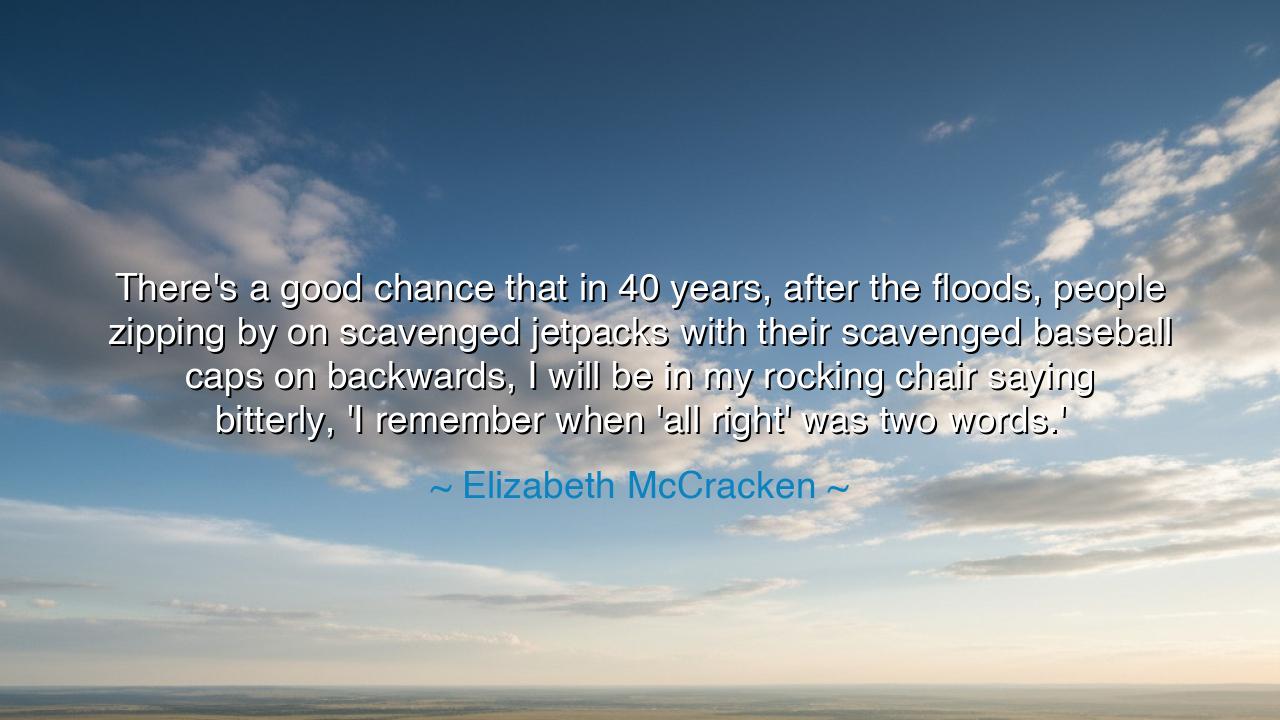
There's a good chance that in 40 years, after the floods, people
There's a good chance that in 40 years, after the floods, people zipping by on scavenged jetpacks with their scavenged baseball caps on backwards, I will be in my rocking chair saying bitterly, 'I remember when 'all right' was two words.'






In the long march of time, there is an eternal truth that whispers through the ages: all things change. Elizabeth McCracken, in her wry and poignant reflection, offers us a glimpse into a future that is at once both humorous and profoundly melancholic. “There’s a good chance that in 40 years, after the floods, people zipping by on scavenged jetpacks with their scavenged baseball caps on backwards, I will be in my rocking chair saying bitterly, ‘I remember when ‘all right’ was two words.’” With these words, McCracken taps into something universal—how language, the very vessel of our thoughts, evolves with the passing of time. She speaks not only of a future shaped by the remnants of what we once knew but of the small, seemingly trivial ways in which we, as a culture, witness the transformation of the world around us.
The humor in McCracken’s words masks a deeper truth: change is inevitable, and often it is the smallest shifts that carry the greatest weight. The way we speak, the words we choose, and even the seemingly insignificant ways we shape our lives—such as how we wear our baseball caps—are all symbols of the world we inhabit. Language, like the winds that erode mountains, shapes the way we understand ourselves and each other. Just as ancient languages evolved over time, so too does the language of today. The phrase “all right,” once neatly two words, now morphs into a single entity, a microcosm of the bigger shift taking place in culture itself.
Consider the ancient Greek philosophers, who, in their time, pondered not only the nature of reality but the very words with which they described it. Socrates and Plato were keenly aware of how language shaped thought, how the evolution of words reflected the evolution of ideas. What we call truth today was not always so; it was once a collection of concepts, slowly pieced together by those who dared to question and redefine. So too, in McCracken’s reflection, we see the same philosophical dance of language: as society shifts, as technology advances, so too must the way we communicate. Words are not stagnant—they are living, breathing entities that evolve alongside us, carrying with them the echoes of the past and the hopes for the future.
McCracken imagines a future where the world has been reshaped by floods, perhaps literal or symbolic of the disasters and changes yet to come. People will be seen zipping by on scavenged jetpacks, an image that evokes both technology’s promises and its consequences. Yet, even as the world around us crumbles or shifts, it is the language—the smallest of things—that will mark the passage of time. The nostalgia of saying, “I remember when ‘all right’ was two words,” reflects the inevitability of this change. Like an elder who recalls the days when the earth was whole, McCracken speaks with the wisdom of someone who understands that the smallest details can carry the deepest emotional weight as the world morphs into something unrecognizable.
The baseball cap on backwards, so emblematic of modern youth culture, becomes a symbol of the future in McCracken’s vision. It’s an image of something imperfect—worn and skewed, a product of a world that no longer adheres to the rules it once did. It evokes the wildness of rebellion, the eagerness of youth, and the acceptance of a world where the traditional is bent or discarded. In this, we see a reflection of the changes happening around us today. The customs of the past—the ways we dressed, the ways we spoke—will likely be relics in the future, but nostalgia will remain a powerful force. Just as today we look back at the old traditions of ancient cultures with a sense of loss or reverence, so too will future generations look back at their own past, with memories of a time when language and fashion had a different meaning.
There is wisdom in McCracken’s imagined future. The message is clear: while change is inevitable, it is essential to remember that it is the small things, the seemingly insignificant moments and details, that often hold the greatest significance. The shift from “all right” being two words to a single word may seem trivial, but it symbolizes much more—it speaks to how we adapt to our changing world, how we let go of the old to make space for the new. In this, we learn that while the world may change in ways we cannot control, we have the power to choose how we respond, how we remember, and how we navigate the evolution of our language and culture.
So, let us take McCracken’s words to heart as a guiding light for the present and future. Let us not mourn the changes that come but embrace them, knowing that they are part of the great unfolding of human existence. Every change, no matter how small, is part of a larger tapestry—a tapestry woven with the threads of culture, memory, and innovation. In our daily lives, let us cherish those small moments, the words we speak, the habits we form, for they are the markers of our time. And when we find ourselves in the distant future, perhaps reflecting on the way things once were, let us do so with the understanding that each generation has its own unique way of defining the world—and the words we use are but one reflection of this ever-changing dance.






AAdministratorAdministrator
Welcome, honored guests. Please leave a comment, we will respond soon